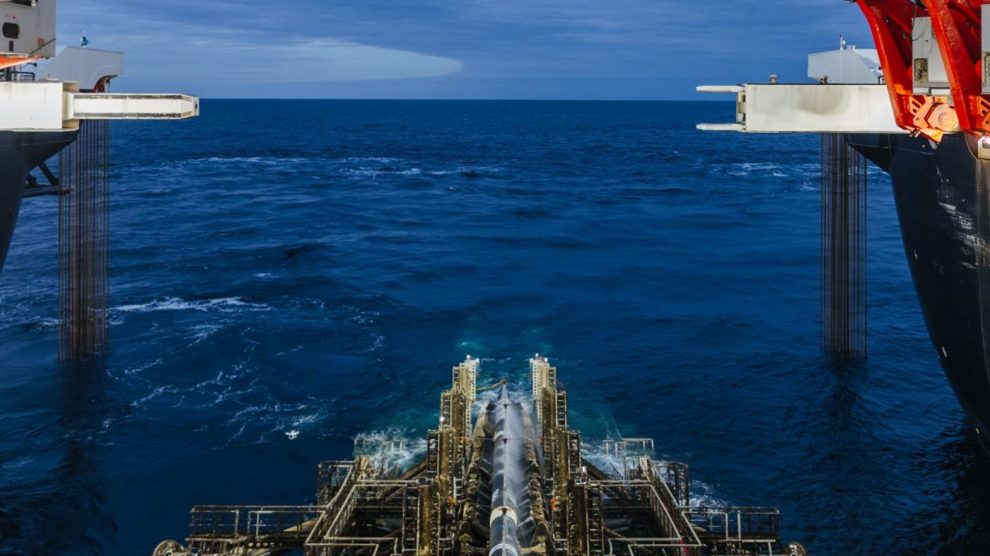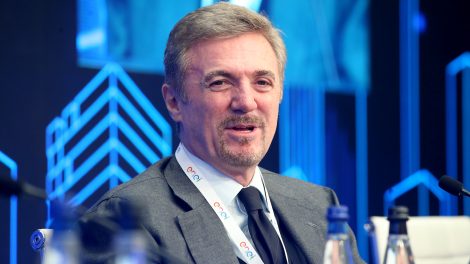The planned EastMed and Italy-Spain gas pipelines are alternative energy supply routes that must be studied in-depth, given the consequences of the Russian invasion of Ukraine. This much was stated by Mario Draghi, Italian Prime Minister, during a meeting with the foreign press on Thursday.
As the PM recalled, the European Commission is studying the feasibility of the EastMed project, a 1,900-kilometre pipeline slated to carry natural gas from the Levantine Basin in the eastern Mediterranean (sitting between Israel, Egypt and Cyprus) to Otranto, in Apulia. However, when asked if these infrastructures can be counted on “in the event of a gas crisis,” he replied negatively.
Gas transportation through EastMed would be feasible in about four years, said Nicola Monti, CEO of Edison – an energy company that guarantees 20% of Italian gas demand. “At a first stage, it would bring Italy an additional flow of 10 billion cubic metres per year.” That amount could be doubled in a later phase, he added.
The geopolitical knot is Turkey, which, as recalled in the latest report of the Italian intelligence agency, “aims to become the main hub for the passage of gas into European territory” and “disputes the criteria for the distribution of the [exclusive economic zone] among the coastal countries,” starting with Greece and Cyprus.
“At the moment, I cannot say whether Turkey is involved” in the EastMed project, continued Mr Draghi, who last week met Turkish President Recep Tayyip Erdoğan on the sidelines of the NATO summit.
What’s certain, he continued, “is that the Commission is continuing the feasibility study. We have to assess the economic sustainability and the energy sustainability, that is, which sources would be hooked up. But what has happened in the last two months strongly changes the feasibility judgments.”
The expert takes
EastMed “was shelved at the time to make room for Nord Stream 2, which was then considered more suited to European needs,” Gianclaudio Torlizzi, founder of T-Commodity and commodities expert, told Decode39.
“In truth, that was an absolutely unfortunate decision that showed Germany’s selfish approach towards its European partners, as well as its underestimation of how wrong it was to tie itself even more closely to Russian supplies,” he continued, stressing how Nord Stream 2 had been a “huge strategic problem for the EU” which is “fortunately being set aside for good.”
Recently, the United States – which had stopped the project over its economic sustainability – also signalled openness in light of the conflict in Ukraine. “It was the wrong time for the US administration to withdraw its support,” said Gina Cohen, a natural gas expert and consultant in the eastern Med.
“Whether this is the right time to restart the project will depend on the feasibility study. If it concludes that it is economically, politically and geopolitically feasible, then this is definitely the ideal time to start building the pipeline, given recent events,” she told Decode39.
Mr Torlizzi, too, noted that he sees no reason why Brussels should not consider the project. He believes EastMed has two strengths: it can extend Italy’s geopolitical projection in the Med and supply it via pipeline, “which is much more efficient than supplying via liquefied natural gas, both in terms of price and stability of supply.”
The war in Ukraine shows that energy supply creates political dependencies, an issue that could also resurface around such a project. “Of course, Europeans want to be self-sufficient, and that’s understandable. But very few countries can go at it alone. The only way to cut dependency is to diversify countries and sources,” noted Ms Cohen.
The new energy and geopolitical balances drawn up by the war in Ukraine pose a question: how intransigent can Turkey be in the face of a gas pipeline, such as the EastMed project, designed to stabilise both energy supply and security in the Mediterranean.
That project seems ready to take off. But there are still a few steps to be taken. The Israeli embassy in Italy explained to Il Messaggero that its partners are waiting for the final results of the feasibility study, which should be completed by the end of 2022.




